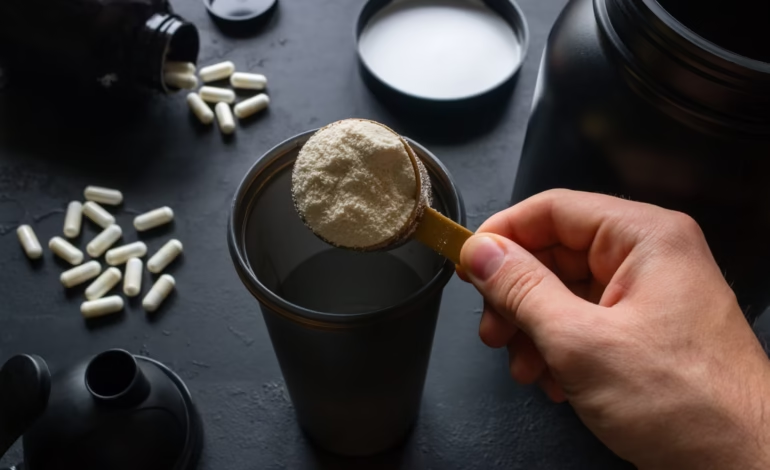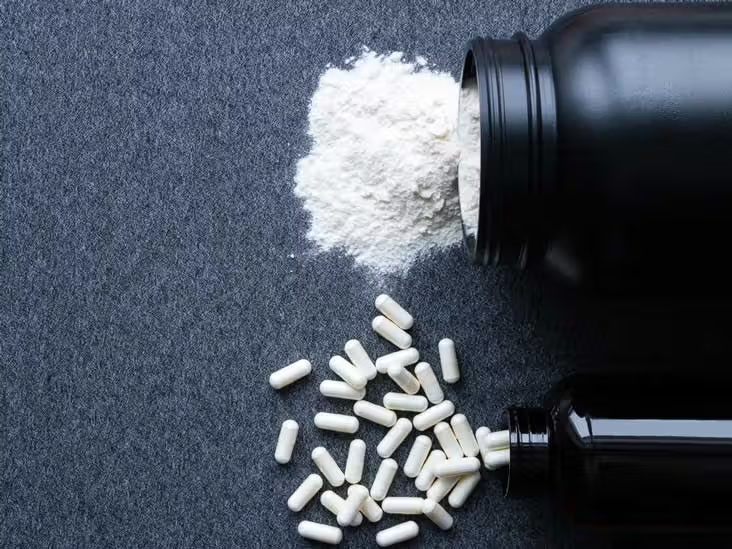Creatine: The Most Hyped Supplement in Fitness — What the Science Really Says
If you’ve spent more than five minutes in a gym or scrolling through fitness influencers on TikTok, you’ve probably heard someone raving about creatine. From shredded bodybuilders to everyday gym-goers,

If you’ve spent more than five minutes in a gym or scrolling through fitness influencers on TikTok, you’ve probably heard someone raving about creatine. From shredded bodybuilders to everyday gym-goers, creatine is praised as the ultimate performance booster. But amid all the hype, one crucial question remains:
Is creatine actually legit—or just another overmarketed powder in a shiny tub?
Spoiler: The hype is backed by a mountain of science. But there’s more to this supplement than just muscle and performance. Let’s break it all down—from inflammation to oxidative stress to what kind of creatine actually works.
What Is Creatine, Exactly?
Creatine is a naturally occurring compound found in muscle cells, where it plays a key role in regenerating adenosine triphosphate (ATP)—your body’s main energy currency during intense activity.
Although your body produces some creatine, and you get a small amount from animal products like red meat and fish, supplementing with creatine (especially creatine monohydrate) dramatically increases your muscle creatine stores.
Why Is Creatine So Popular?

Because it consistently delivers on its promises. According to decades of peer-reviewed studies, creatine is one of the most effective and safest sports supplements on the market.
Key Benefits:
- Increased strength & explosive power
Countless studies have shown that creatine improves performance in high-intensity, short-duration activities like weightlifting, sprinting, and HIIT. - Faster muscle growth
Creatine helps increase cell volumization (drawing water into muscle cells), which sets the stage for greater muscle protein synthesis and long-term hypertrophy. - Improved workout recovery
Here’s where things get interesting—creatine doesn’t just fuel performance. It also supports recovery through its anti-inflammatory and antioxidant properties.
What Does Creatine Do for Inflammation?
Research suggests that creatine can reduce inflammation markers following strenuous exercise, potentially speeding up recovery and reducing soreness.
“Creatine supplementation has been shown to decrease pro-inflammatory cytokines such as TNF-alpha and IL-6,” says a 2021 review in Nutrients. “These effects may contribute to improved muscle recovery and decreased exercise-induced damage.”
By buffering oxidative stress and helping maintain cellular integrity, creatine plays a role in modulating your body’s inflammatory response—something that can be hugely beneficial during intense training blocks or post-injury rehab.
Creatine and Oxidative Stress: The Surprising Brain Benefit
Emerging research also connects creatine to reduced oxidative stress, particularly in the brain. Oxidative stress—caused by an imbalance between free radicals and antioxidants—can lead to cellular damage and inflammation.
A 2019 study published in Frontiers in Nutrition concluded that “creatine may protect cells from oxidative damage by stabilizing mitochondrial function and scavenging reactive oxygen species (ROS).”
That means creatine could support both muscle and cognitive health—especially in high-stress or sleep-deprived states. No wonder it’s being studied for neurodegenerative conditions like Parkinson’s and Alzheimer’s.
What Results Should You Expect?
Here’s what most users can expect from consistent creatine use (assuming proper training and nutrition):
| Benefit | Timeline |
| Strength gains | 1–2 weeks |
| Muscle fullness | Within days |
| Performance improvements | 2–4 weeks |
| Reduced soreness | 2–3 weeks |
| Cognitive clarity (some users) | 1–4 weeks |
Note: Creatine doesn’t work like a pre-workout—you won’t “feel” it immediately. It builds up in your muscles over time, so daily use is essential, even on rest days.
Read About: The Collagen Supplement Lies We Were Told: Science vs. Hype in the Age of Anti-Aging
What’s the Best Type of Creatine?
Creatine Monohydrate is the gold standard.
- Most studied: Over 1,000 clinical studies have tested creatine monohydrate.
- Cost-effective: It’s inexpensive and widely available.
- Highly effective: It delivers results equal to or better than newer, pricier “designer” versions.
Other forms like creatine hydrochloride (HCl) or buffered creatine have fancy labels but no clear advantage in the research.
“Creatine monohydrate remains the most effective and well-supported form,” according to the International Society of Sports Nutrition (ISSN).
Should Creatine Be Combined with Other Supplements?
Absolutely. It can work synergistically with other evidence-based compounds:
- Beta-Alanine: Enhances muscular endurance by buffering acid buildup. Stack with creatine for improved performance in both short and medium-duration workouts.
- Protein (Whey or Plant-Based): Helps repair and rebuild muscle post-training. Combining protein and creatine post-workout supports both recovery and growth.
- Carbohydrates: Spiking insulin slightly (via carbs or carb-containing meals) may increase creatine uptake into the muscles.
A smart stack might look like:
- 3–5g creatine monohydrate
- 20–30g whey protein
- 25–40g fast-digesting carbs (e.g., banana or oats)
Is Creatine Safe Long-Term?
Yes. Despite persistent myths, creatine has been studied for decades with no evidence of harm in healthy individuals.
“Long-term creatine supplementation (up to 5 years) is safe in healthy populations when taken at recommended doses,” according to the ISSN’s position stand.
The only consistent side effect reported is mild water retention, particularly during the initial loading phase (which, by the way, is optional).
Bottom Line
Creatine isn’t just for bodybuilders or gym bros—it’s for anyone who wants to perform better, recover faster, and possibly even protect their brain.
With proven benefits for strength, muscle recovery, inflammation, and oxidative stress, creatine monohydrate earns its title as the fitness industry’s most reliable supplement.
And best of all? It’s dirt cheap, safe, and backed by real science.
By Ravoke News Desk for Ravoke.com








